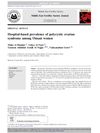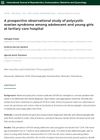63 citations
,
August 2022 in “Diagnostics” Hirsutism can occur in women with PCOS even if their androgen levels are normal, making diagnosis challenging.
 16 citations
,
July 2020 in “Health and Quality of Life Outcomes”
16 citations
,
July 2020 in “Health and Quality of Life Outcomes” Women with Polycystic Ovary Syndrome (PCOS) have a lower health-related quality of life, especially those with an anovulatory phenotype, and may need specific interventions to improve it.
 129 citations
,
January 2019 in “Clinical medicine insights”
129 citations
,
January 2019 in “Clinical medicine insights” Obesity worsens PCOS symptoms, and PCOS may lead to more weight gain; managing both requires a holistic approach that includes mental health.
317 citations
,
April 2018 in “Journal of steroid biochemistry and molecular biology/The Journal of steroid biochemistry and molecular biology” PCOS is a complex condition in women that can lead to health issues, and lifestyle changes are the best management approach.
28 citations
,
January 2017 in “Obstetrician & gynaecologist/The obstetrician & gynaecologist” The document concludes that managing PCOS effectively requires considering ethnic differences, obesity's impact, and ethical concerns in treatment approaches.
 767 citations
,
September 2016 in “Human Reproduction”
767 citations
,
September 2016 in “Human Reproduction” Polycystic ovary syndrome affects about 6-10% of women, with varying symptoms and the need for standardized global definitions.
 9 citations
,
August 2013 in “Middle East Fertility Society Journal”
9 citations
,
August 2013 in “Middle East Fertility Society Journal” About 7% of Omani women visiting a gynecology clinic had polycystic ovarian syndrome, similar to rates in other countries.
 45 citations
,
November 2012
45 citations
,
November 2012 The conclusion is that androgen receptor gene polymorphism might be a marker for polycystic ovary syndrome, but more research is needed.
 48 citations
,
May 2012 in “Journal of Midwifery & Women's Health”
48 citations
,
May 2012 in “Journal of Midwifery & Women's Health” Polycystic Ovary Syndrome is common but often undiagnosed, and early treatment is important to prevent health problems.
 50 citations
,
December 2010 in “Bjog: An International Journal Of Obstetrics And Gynaecology”
50 citations
,
December 2010 in “Bjog: An International Journal Of Obstetrics And Gynaecology” South Asian women with PCOS experience more psychological distress and have a poorer quality of life, especially in social relationships, with hirsutism affecting them more than obesity.
 111 citations
,
November 2010 in “Human Reproduction”
111 citations
,
November 2010 in “Human Reproduction” South Asian women with PCOS are more likely to have metabolic issues and central obesity, and simple measures like waist size and blood pressure can help identify these risks early.
 105 citations
,
January 2009 in “Medicine”
105 citations
,
January 2009 in “Medicine” Hirsutism is more linked to high androgen levels than acne or hair loss, and a mix of hormonal tests is best for diagnosis; certain treatments can reduce symptoms.
502 citations
,
February 2008 in “The Journal of Clinical Endocrinology & Metabolism” Treat significant hirsutism with medication and hair removal; use birth control pills first, adding antiandrogens if needed.
 352 citations
,
January 2006 in “The Journal of Clinical Endocrinology and Metabolism”
352 citations
,
January 2006 in “The Journal of Clinical Endocrinology and Metabolism” Most women referred for excess male hormone symptoms had polycystic ovary syndrome (PCOS), with other conditions being less common.
 56 citations
,
August 2005 in “Journal of Investigative Dermatology Symposium Proceedings”
56 citations
,
August 2005 in “Journal of Investigative Dermatology Symposium Proceedings” Different women's hair and skin glands respond to hormones in varied ways, which can cause unwanted hair growth even with normal hormone levels, and more research is needed to treat this effectively.
















